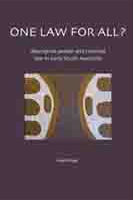One Law for All? Aboriginal people and criminal law in early South Australia
Summary
In the planned colony of South Australia, Aboriginal people were to be British subjects, accountable to English law, but fully entitled to its protection. However, the dreams of London’s reformers rapidly soured as British law struggled to protect the settlers’ interests and failed to protect Aboriginal lives and birthrights. Using rarely discussed documents, Pope reveals how the complexities played out and where, despite the rhetoric, Aboriginal people were treated poorly.
This is the first study of the stories behind the court appearances. It reveals the people who developed relationships across the racial divide: Aboriginal people confused about why they were facing a magistrate and deciding whether to resist the invaders or move quietly into their society; colonists struggling to keep their pastoral enterprises going, and finding there was more to the story than they thought; officials working with inadequate resources and lawyers mounting arguments to keep their Aboriginal clients out of gaol; and, a Chief Justice trying to apply English law to Indigenous citizens.
Using rarely discussed documents, Pope reveals how the complexities played out and where, despite the rhetoric, Aboriginal people were treated poorly.
Alan Pope’s previous book is Resistance and Retaliation. After a career in education, including time as a teacher and curriculum writer, Alan Pope now manages an Australian training program for Iraqi public servants.
Reviews and endorsements
The superior production values and clarity of writing in Pope's work will help ensure that it remains the ‘must-read’ authority on criminal law's encounter with Indigenous people during the early decades of Australia's settlement history.
-- Mark Finnane, An extract of a review from Australian Historical Studies, Vol 44, Issue 1, April 2013
